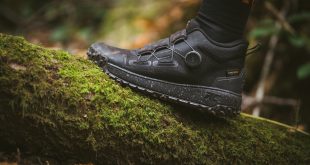Created to withstand the challenging MTB terrain and climate in the north west of the USA, PNW is a component brand at home in British conditions. Alex Ballinger spoke to founder Aaron Kerson to hear about plans for the UK market.
This piece first appeared in the August edition of BikeBiz magazine – get your free subscription here
PNW Components is a mountain bike brand immersed in what riders want.
Founded in 2015 by Aaron Kerson, a former product developer for the likes of Specialized and Marin, PNW was born from a desire to bring quality, durable components that wouldn’t break the bank.
Kerson began to develop the idea for his own component brand while travelling the world for other bike brands, working with customers to establish their wants and needs, utilising that knowledge to develop new products.
“We got to the point where my wife and I wanted to create a brand that really focussed on providing the best customer experience in the industry,” said Kerson, “and also focused on the fun aspect of riding, like getting out there with your buddies, and having a good time.”
Kerson noticed that a number of component brands centred their marketing around elite levels of cycling, which he felt alienated a number of riders.
The result was PNW, an MTB component brand that offers a host of products, from dropper posts, to handlebars, stems, and apparel.
Alongside the focus on fun, Kerson also had some other key pillars to the business he was building: “We wanted to embrace a digital presence. We needed to figure out how we get in front of customers, so that when they were looking for product reviews or new brands we were coming up. That’s an area we really focused on.
“And then the remaining piece was that we needed to have a dealer network.
“In the US, we have around 2,000 bike shops that we’re working with and these shops are coming to us looking for parts, because typically customers are asking for stuff, and that’s been incredible for the business.”

Why the UK?
While PNW does offer its products directly to consumers, Kerson believes its dealer network is key to the business, and the brand has plans to expand in the UK.
On UK expansion, Kerson said: “It’s long overdue, to be totally honest.
“We’ve been shipping from the US into the UK for years. It costs us more to ship, there’s duties, there’s import costs, but to me that’s an investment in that market, to get people thinking about the product and talking to their buddies about it.
“Quite honestly, we’ve kind of dragged our feet because any time we forecast product just for the UK, it’s been eaten up domestibally because we’ve been growing very quickly. I also wanted.”
While deciding on how its UK operation might look, PNW was contacted by Sandy Plenty of The Trailhead bike shop in Shrewsbury – a conversation which resulted in Plenty taking on distribution of PNW products in the UK in January.
Kerson said: “We’ve been realy stoked on that, it’s been working very well.
“In the UK market the weather is generally similar to here in the Pacific North West – similar types of weather and similar types of riding conditions.
“I know the UK is very diverse, but there’s a lot of rain, a lot of mud, a lot of roots, a lot of really steep stuff.
“Riders from the UK are telling us that it sounds very similar to what we’re dealing with, and we’re developing products for these conditions.”
“You guys are focused on reliability as well as affordability, so that goes a long way.”

Slowdown
Like most in the bike trade, PNW has been pinched by the sudden decline in demand following the coronavirus cycling boom.
“It’s been challenging for sure,” said Kerson.
“The thing that helped us was that as we’re on the direct to consumer side, we were able to see that the market slowed down. We were also getting some insight from factories that work with big OEM customers – they were starting to slow down, so that made us think something is going on here and we need to adapt, so we started reducing our orders and really tried to move inventory.
“If you’re going through a distributor, the dealer first tells the distributor that things are slowing down, the distributor tells the brand, and then the brand has to tell the factories, so there’s additional pieces that take longer.
“By having a more simplified business model, working directly with our retailers as well as our customers, we’re able to react much faster.”

The US picture
The UK trade has been hit hard by the recent slowdown in demand, with the closure of a number of distributors and brands, but how is the picture in the US?
“We haven’t seen anyone going bankrupt yet,” said Kerson, “but we have seen a lot of inventry.
“I don’t think that the market has crashed, I think that there’s just too much inventory so people are trying to catch up, move products, and get those dollars backso they can buy product again from brands.
“We’ve seen the dealer side has slowed, but it’s not dramatic.
“We’ve also been hearing that the high-end bike side of things like complete bikes really hasn’t been impacted that much. I think it’s mainly the mid and low-end bikes that are the areas where there’s tons of overstock and not as many people buying.”
 BikeBiz Bicycle and cycling retail news
BikeBiz Bicycle and cycling retail news

